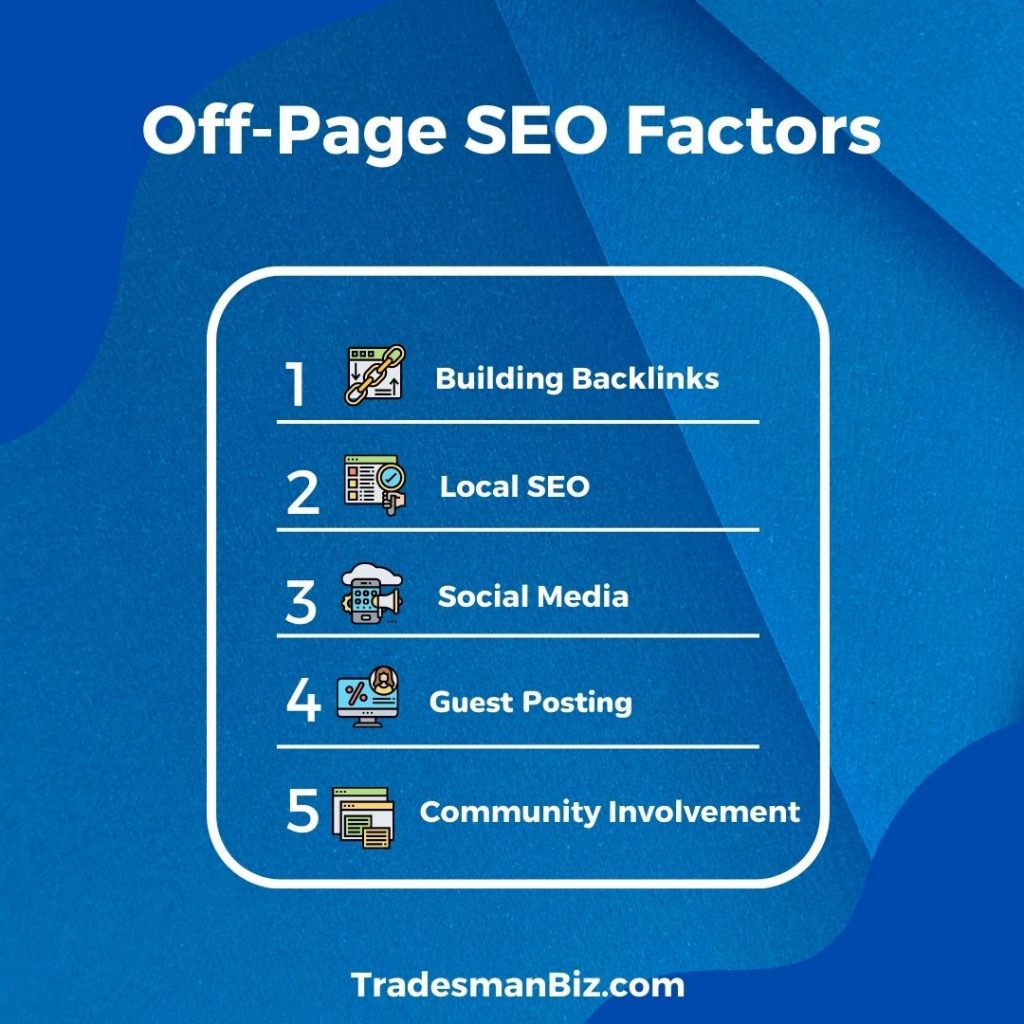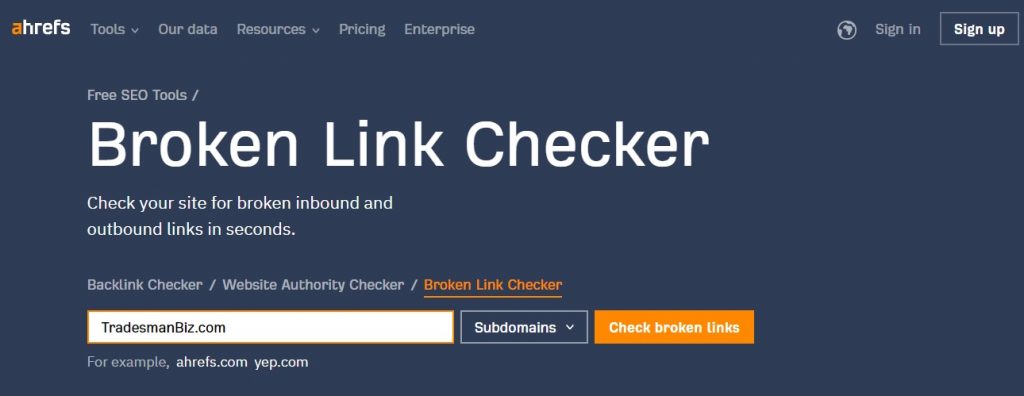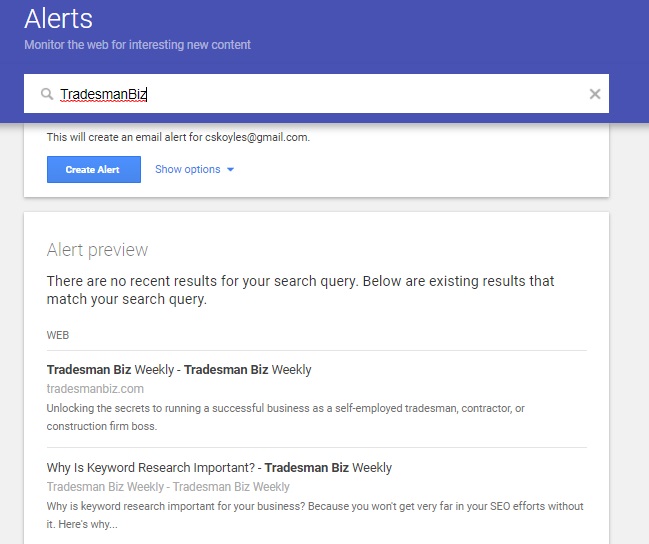Off-page SEO includes a variety of factors, such as building high-quality backlinks, leveraging social media, optimizing local SEO, and managing online reviews, all of which help to improve your ranking and visibility in search results.
In this comprehensive guide, I’ll share with you a more detailed answer to the question “what does off-page SEO include” and examine how and why these critical off-page factors make such a difference to the success of your site.
I’ll also share with you some top tips and strategies for implementing each factor into your overall search engine optimization strategy and tracking their success.
By the end of this guide, you’ll have a solid understanding of off-page SEO and how to improve your website’s online presence.
What Does Off-Page SEO Include? 5 Key Factors

1. Backlinks
Backlinks are undoubtedly the most essential factor of off-page SEO as they have the biggest role to play in boosting your site’s reputation in the eyes of Google, leading to improved rankings and more traffic.
What exactly is a backlink?
In simple terms, it’s a link that comes into your website from another third-party site. This is why you’ll also see them referred to as “inbound links” or “incoming links.”
But why do they matter?
Backlinks act as a vote of confidence for your website, indicating to search engines that other websites consider your content to be valuable and trustworthy. In turn, this can improve your website’s ranking in search engine results pages (SERPs).
However, not all backlinks are created equal.
In fact, some low-quality backlinks can actually hurt your website rather than help it, especially if they come from unreliable sources.
As such, if you’re really going to reap the benefits of off-page SEO, you’ll need to focus on obtaining high-quality backlinks from authoritative and relevant websites.
3 Effective Backlink-Building Strategies
1. Broken Link Building
Broken link building involves finding broken links on other websites and suggesting that they replace them with a link to your own website.

This strategy works because broken links can harm a website’s ranking, and webmasters are often happy to replace them with working links.
To find broken links, you can use a free tool like Ahrefs Broken Link Checker.
Once you’ve found a broken link, you can reach out to the website owner and suggest a replacement link to your own content that is relevant to the broken link.
2. Resource Page Link building
Resource pages are pages on websites that curate links to high-quality resources and information on a particular topic.
These pages can be a valuable source of backlinks, as they are often linked to by other websites and can provide long-term traffic.
To get your website listed on a resource page, you can search for relevant resource pages using a search engine or a tool like Ahrefs.
Once you’ve found a relevant resource page, you can reach out to the website owner and suggest that they include a link to your website if they find your content valuable and relevant to their audience.
Overall, obtaining high-quality backlinks takes time and effort, but it is well worth it in terms of improving your website’s ranking and visibility in search engine results pages.
By using strategies like guest blogging, broken link building, and resource page link building, you can build a strong backlink profile that helps your website stand out from the competition.
3. Skyscraper Technique
The Skyscraper technique involves creating high-quality content that is better than what’s already out there and reaching out to websites linking to the inferior content, asking them to link to your improved version.
This can be an effective backlink strategy for plumbers who want to improve their website’s search engine ranking.
To implement this strategy, you need to start by researching the top-performing content in your niche. Look for articles or blog posts that are popular and have many backlinks.
Once you’ve identified the best content in your niche, it’s time to create something even better. You can do this by adding new information, providing more detailed explanations, including better images or videos, or improving the formatting of the content. The key is to create something that is more valuable and engaging than what’s already out there.
Once you’ve created your high-quality content, it’s time to reach out to the websites that are linking to the inferior content you’re looking to improve upon. Send them a polite email, introducing yourself and your website, and explain how your new and improved content can add value to their website. Don’t forget to include a link to your content in the email. If the website owners find your content valuable, they may be willing to link to it, boosting your website’s search engine ranking and increasing your visibility in the plumbing industry.
2. Local SEO
Local SEO is the process of optimizing a website to increase its visibility for location-specific searches. For example, if someone searches for “best pizza places in Brooklyn,” Google will show them relevant results for pizza places in the Brooklyn area.
For service-based businesses, such as plumbers, electricians, and home repair services, local SEO is crucial for attracting new customers from the surrounding areas.
The importance of local SEO lies in the fact that most consumers conduct local searches before making a purchase.
Some 97% of users search online to find a local business, with 28% following up their search with a purchase.
In other words, if your business isn’t showing up in local search results, you’re missing an opportunity to reach the kind of potential customers who are actively looking to hire your services.
3 Useful Local SEO Optimization Strategies
To optimize local SEO, businesses need to focus on three key areas: directory listings, online reviews, and other tactics.
1. Directory Listings
Directory listings are online directories that list information about your business, such as your business name, address, phone number, and website.
Some of the most popular directories for local businesses include Google My Business, Yelp, Bing Places for Business, and Yellow Pages. You’ll find a whole bunch more in my guide to 13 free advertising sites for plumbers.
2. Online Reviews
Online reviews are an essential part of local SEO.
Positive reviews not only improve your business’s reputation but also increase its visibility in search results.
To encourage customers to leave reviews, you’ll need to make it as easy as possible for them to do so.
This can include adding “leave us a review” calls to action on your website or including links to your Google My Business or Yelp pages your email signature.
Responding to reviews, both positive and negative, can also improve a business’s reputation and show that they value customer feedback.
3. Create content
In addition to directory listings and online reviews, I also recommend that you carry out local keyword research and create location-specific blog posts and landing pages using those keywords.
3. Social Media
It may come as a surprise to some to learn that off-page SEO includes a heavy emphasis on social media.
When you create social media profiles for your plumbing business and post regular updates, you’re not only providing valuable information to your followers, but you’re also building your brand’s reputation online.
By sharing educational content and offering promotions, you can engage your audience and encourage them to share your posts with their own networks. This not only helps you reach more potential customers, but it can also improve your website’s search engine ranking.
When search engines see that your social media pages are active and engaging, they’re more likely to view your website as credible and trustworthy. This can lead to higher search engine rankings, more website traffic, and ultimately, more business for you.
So if you haven’t already, consider creating social media profiles for your plumbing business and start posting updates on a regular basis. By sharing valuable content and engaging with your audience, you can improve your off-page SEO and grow your business online.
3 Top Tips for Social Media Off-Page SEO Optimization
1. Use Hashtags
By including relevant hashtags in your social media posts, you can increase the visibility of your content and make it easier for potential customers to find you.
For example, if you’re posting about a plumbing repair service, you might use hashtags like #plumbingrepair, #emergencyplumbing, or #plumbingtips.
2. Encourage Engagement
Social media platforms reward engagement, so try to create content that encourages your followers to like, comment, and share your posts. You could ask questions, run polls, or share fun and informative videos that prompt engagement.
3. Collaborate with Others
Partnering with other businesses in your area or industry can help you reach new audiences and improve your off-page SEO.
Consider teaming up with other service providers, local businesses, or even influencers to co-create content or run joint promotions.
4. Guest Posting
When you write a guest blog post for another website, you’re not only providing valuable content to their audience, but you’re also showcasing your knowledge and expertise on a particular topic. This can help you build your reputation and establish yourself as a thought leader in your field.
But guest blogging isn’t just good for your reputation – it can also be great for your off-page SEO. By including links back to your website in your guest blog post, you can generate valuable backlinks that can help boost your search engine ranking.
3 Simple Steps for Guest Posting
1. Find Relevant Websites With DoFollow Backlink Opportunities
Look for websites in your industry that accept guest blog posts.
You can search for relevant keywords on Google Keyword Planner, or use platforms like Buzzsumo or Alltop to find popular websites in your industry.
Ideally, you’ll want to look for those that will allow you to include a dofollow backlink in either the content itself or your author bio.
A dofollow link is a type of hyperlink that tells search engines to follow the link to the destination website. This means that when you include a dofollow link back to your website in a guest blog post, it can help improve your search engine ranking.
2. Pitch Your Idea
Once you’ve identified some potential websites, reach out to them with your idea for a guest blog post. Be sure to personalize your pitch and explain why your idea would be a good fit for their audience.
3. Write a Top-Quality Post
Once you’ve secured a guest blogging opportunity, be sure to put your best foot forward and write a great post.
Make sure it’s informative, engaging, and provides real value to the website’s audience. And of course, be sure to include a link back to your website to help improve your off-page SEO.
By incorporating guest blogging into your overall marketing strategy, you can establish yourself as an expert in your field, generate valuable backlinks to your website, and ultimately, attract more customers to your business.
4. Brand Mentions
A brand mention is simply when another website or social media user mentions your business or brand name online. This can include things like your business name, website URL, or social media handles.
Brand mentions can provide a number of benefits for your business, including improving your online visibility and reputation, driving traffic to your website, and even improving your search engine ranking. When other websites or social media users mention your brand name online, it helps to build trust and credibility with potential customers, which can ultimately lead to more conversions and sales.
For example, let’s say you’re a plumbing business and a local news website mentions your business in an article about the top plumbing companies in the area.
This brand mention can help improve your online reputation and also drive traffic to your website if the article includes a link back to your website.
3 Top Tips for Making the Most of Brand Mentions
1. Monitor Your Brand Mentions
Use tools like Google Alerts or Mention to monitor when your brand name or website URL is mentioned online.

This can help you stay on top of your online reputation and even provide opportunities to engage with potential customers.
2. Reach Out to Websites
If you notice that a website in your industry has mentioned your brand name but didn’t include a link back to your website, reach out to them and politely ask if they could include a link.
This can help drive traffic to your website and also improve your search engine ranking.
3. Use Brand Mentions to Boost Your Brand Reputation
The more reputable and well-known your brand is, the more likely you are to receive brand mentions.
Focus on building a strong brand reputation by providing high-quality products or services, engaging with your customers on social media, and actively seeking out opportunities to partner with other websites or influencers in your industry.
5. Forum and Social Media Contributions
Contributing to forums and social media groups involves sharing your expertise and knowledge by answering questions, providing helpful advice, and engaging with other users in online communities.
This can include industry-specific forums, social media groups, or even Q&A websites like Quora.
How does it benefit your business?
Contributing to forums and social media groups can provide a number of benefits for your business, including:
- Bolstering your reputation as an authority in your field
- Driving traffic to your website through backlinks in your forum or group profile
- Increasing your online visibility and exposure
- Building relationships and networking with other industry professionals
For example, let’s say you’re a plumbing business and you regularly contribute to a home renovation forum.
By providing helpful advice and insights on plumbing-related questions, you can establish yourself as an authority in your field and build trust with potential customers.
Additionally, if you include a link to your website in your forum profile, you can drive traffic to your website and also improve your search engine ranking through the backlink.
By finding the right communities, providing value, and including links back to your website, you can leverage forums and social media groups to improve your off-page SEO and grow your business.
3 Strategies to Include in Off-Page SEO Forum Posting
1. Find the Right Communities
Focus on finding online communities that are relevant to your industry and target audience.
This can include industry-specific forums or social media groups, as well as Q&A websites like Quora.
2. Provide Value
When contributing to forums and social media groups, always focus on providing value to other users.
Answer questions thoroughly and thoughtfully, and provide helpful advice and insights that demonstrate your expertise in your field.
3. Use Backlinks in a Non-Pushy Way
When possible, include links back to your website in your forum or group profile.
This can help drive traffic to your website and also improve your search engine ranking.
If you’re thinking of adding links in the body of your forum posts, make sure they’re relevant to the subject and genuinely help users with the problems they’re facing.
Otherwise, those links will come across as spam and undermine your reputation as someone who genuinely wants to help.
Frequently Asked Questions About Off-Page SEO Factors
What is the most important part of off-site SEO?
Is off-page SEO the same as technical SEO?
Is off-page SEO better than on-page SEO?
What Does Off-Page SEO Include? A Recap
As you’ve learned in this guide, off-page SEO includes numerous factors such as backlink building, reputation management, and local SEO, all of which can contribute towards improving your search rankings and, in turn, driving more traffic to your website.
By following the strategies and suggestions outlined above, you’ll be able to take greater control of your overall web presence and win more customers for your service business.
For more tips and techniques, see my definitive guide to SEO for tradesmen, packed with 25 quick-and-easy wins to up your search engine optimization game.
For more weekly advice on how to start, manage, and grow your business as a self-employed tradesperson or contractor, follow Tradesman Biz on Twitter, Facebook, or Linkedin.

Leave a Reply